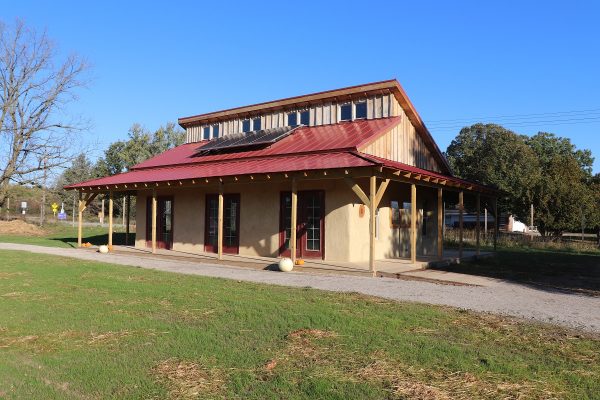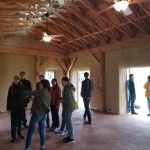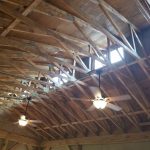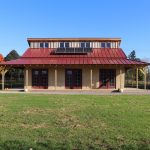
Straw bale building uses solar panels for sustainable energy. Joshua Mehay | Washtenaw Voice
By Matthew Bartow
Contributor
A straw-bale building built by over 20 students was unveiled on the U of M Campus Farm at the Matthaei Botanical Gardens on October 7. The building is both the first off-the-grid and student-constructed building on U of M’s campus.
Logan Vear, one of the student builders, said the project was a major undertaking.
“We spent over 80 hours a week in May actually building the foundation for the building,” said Vear, a senior studying environmental engineering. “And that was after spending an entire semester planning the project, including writing grants.”
Trumpey, an associate professor of natural resources and program at U of M’s, who oversaw the construction of the building, said it was not his first time building with straw.
“I built my own straw house in Grass Lake over a decade ago,” said Trumpey. “Seeing how well it has worked inspired me to lead students in constructing straw houses.”
The team also built a similarly constructed building last year at U of M’s Biological Station in Pellston, Michigan.
Most of the raw materials used to construct the building were from recycled materials, Trumpey said, and some came from the Campus Farm itself.
- U of M unveils off-grid building. Matthew Bartow | Washtenaw Voice
- Interior ceiling beams and overhead fans. Matthew Bartow | Washtenaw Voice
- On the U of M Campus Farm at the Matthaei Botanical Gardens. Joshua Mehay | Washtenaw Voice
“The straw for the house came from farm waste,” he said. “The wood for the post-and-beam roof was milled from dead trees. Golf cart batteries store the sun’s energy (through the use of solar panels) to provide electricity for the building.”
Soil, clay and sand from the Campus Farm were used to mix up the adobe for both the interior and exterior of the building.
The straw building’s location on the Campus Farm is not a coincidence. Carly Sharp, a student far, volunteer and a senior engineering major, said the building and the farm are focused around one major mission: sustainability.
“Our mission is to promote sustainability and sustainable living practices, because we need to protect the environment and the world around us,” Sharp said. “The farm provides space for groups interested in sustainability to gather and learn from each other. The straw bale building is a perfect example of that.”
The building will serve as a meeting place for farm-to-table dinners hosted by Michigan Dining.





